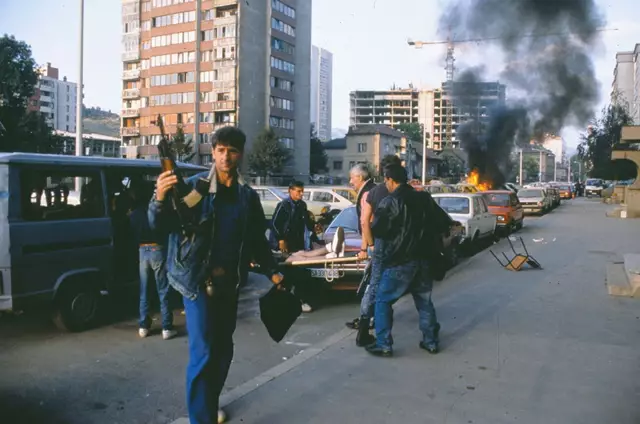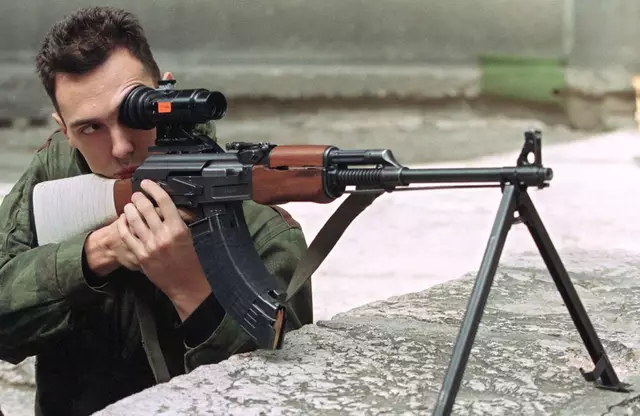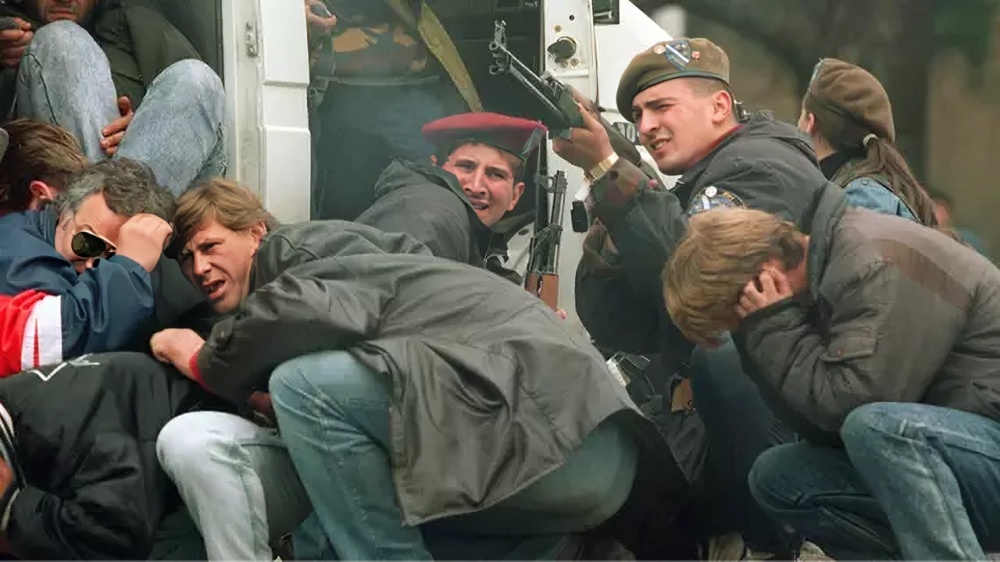Introduction
New allegations emerging from Italy have reopened one of the darkest chapters of the Bosnian War. Investigators there are examining claims that wealthy foreigners paid vast sums of money in the 1990s to fire on civilians in Sarajevo, turning one of modern Europe’s most tragic conflicts into what one journalist has described as a “human safari.” The accusations are shocking. They also raise difficult questions about wartime accountability, intelligence agencies, and the long shadow of the siege that claimed more than 10,000 lives.
Italian writer and journalist Ezio Gavazzeni says he has uncovered evidence pointing to organized trips that allowed visitors to shoot at the besieged city. His findings have been handed to prosecutors in Milan. While these claims have surfaced in the past, they have never before reached this level of formal review. Now, Italian officials say they are going through interviews, testimony, and intelligence reports to determine whether criminal charges could be brought.
The investigation remains in its early stages. Yet even the possibility of such events stirs old pain in Bosnia and brings renewed focus to a conflict that has never fully healed.
How the Allegations Came to Light
Gavazzeni is not new to investigating difficult and violent subjects. He is known in Italy for his reporting on terrorism, organized crime, and geopolitical conflicts. According to interviews published in Italian media, he first encountered brief references to these allegations decades ago. At the time, he says, the stories seemed so extreme that he assumed there had to be missing details or misinterpretations.
But the subject returned to his attention after the release of Sarajevo Safari in 2022 — a documentary by Slovenian director Miran Zupanič. The film included testimony from a former Serb soldier who said foreigners paid to shoot at civilians from sniper positions overlooking Sarajevo. That detail pushed Gavazzeni back into the archives. He began collecting reports, interviewing sources, and requesting historical files. Over time, he says, the scattered references began to form a clearer outline.
This year, after compiling what he described as a 17-page report, he delivered his findings to counterterrorism prosecutor Alessandro Gobbis in Milan. That submission triggered the investigation now underway.

Inside the Alleged “Safari” System
According to Gavazzeni’s account, wealthy foreigners traveled from Western Europe and other parts of the world to Serb-held positions in the hills surrounding Sarajevo. These locations offered clear views of the streets and neighborhoods below. The siege lasted from 1992 to 1995, and Sarajevo’s geography left civilians exposed to sniper fire almost daily.
The allegations claim that certain individuals paid large sums for the chance to use these vantage points themselves. Prices, according to testimony, varied depending on whom the shooters targeted. Men and women were reportedly assigned different rates. Children were priced higher.
Gavazzeni said in one newspaper interview that estimates ranged upward of €100,000 per visit. Other accounts mention figures close to $90,000. None of these prices have been independently verified, and investigators have not yet released supporting evidence.
If any of this is proven, Italian prosecutors say the individuals involved could face murder charges or accessory liability under Italy’s laws governing crimes committed abroad.

Testimony From a Bosnian Intelligence Officer
Central to the new probe is the reported testimony from a former Bosnian military intelligence officer. According to the documents reviewed by Italian media outlets, the officer said that Bosnian forces discovered these alleged trips in 1993. His unit, he claims, passed the information to Italy’s military intelligence agency, SISMI, in 1994.
The officer recounted being told at the time that Italy would intervene to stop the activity. He says he was later informed that the trips had been halted, though he did not see documentary proof.
This testimony forms a key part of the Milan investigation. Prosecutors are now working to verify the officer’s identity, confirm his role during the war, and determine how much documentation — if any — was preserved.
Earlier Rumors and Longstanding Suspicions
This is not the first time such stories have surfaced. During and after the Bosnian War, several claims appeared in regional reports and survivor accounts. Many dismissed them as wartime exaggerations. Others argued that the chaos of the conflict made it difficult to separate rumor from truth. Still, the idea that foreign visitors might have participated in sniper attacks lingered in the background of some postwar conversations.
The documentary Sarajevo Safari reignited public discussion. It featured interviews suggesting the practice was known to certain military units, though it did not include documents or formal records. The filmmaker described his intent as uncovering overlooked stories rather than issuing legal accusations.
Now, for the first time, law enforcement authorities in a European country are treating the claims as potentially prosecutable history rather than folklore.

Why Italy Is Investigating
Italy became a focal point partly because of geography. According to the allegations, some foreign visitors traveled through Trieste, a city near the Slovenian border, before heading toward Bosnia. The route, if true, would have placed certain activities within Italy’s investigative reach.
Prosecutor Gobbis is known for taking on complex cases related to terrorism and transnational crime. Officials in Milan say they want to determine whether Italian nationals participated — and whether Italian territory was used as part of the route.
The Bosnian government has expressed support for uncovering the truth. A spokesperson for the Bosnian Consulate in Milan said officials are prepared to cooperate with Italian investigators and share any relevant information.
The Broader Human Toll of the Siege
The siege of Sarajevo remains one of the most widely documented atrocities of the 1990s. More than 10,000 civilians and soldiers died. Residents spent nearly four years without regular access to electricity, water, medical care, or safe passage through their own streets. Sniper fire became a daily threat. People crossed intersections at a sprint. Schools, hospitals, and markets were frequently struck.
If the allegations of “sniper tourism” prove accurate, they would add a disturbing layer to an already brutal period — the idea that outsiders may have used the city’s suffering as a recreational opportunity.
Survivors of the siege have reacted with a mix of horror, exhaustion, and resignation. Some say they long suspected such things occurred but lacked evidence. Others say the idea feels almost unbelievable, even after everything they endured.
What Investigators Are Looking For
Italian authorities have not released specifics, but legal experts say they are likely searching for:
-
Travel records linking individuals to the alleged routes
-
Military logs or operational notes from Serb positions
-
Testimony from former soldiers stationed in the hills
-
Financial transfers that might match the described payments
-
Intelligence correspondence between Italy and Bosnian agencies
Much of this evidence may be difficult to locate three decades later. Some records may have been destroyed. Others may never have existed. Prosecutors may need to rely heavily on interviews, cross-checking accounts from different witnesses, and analyzing whether testimonies align with documented facts about the siege.
Why the Claims Still Matter
Even if the Milan investigation does not lead to formal charges, the inquiry itself carries weight. It shines a light on events that remain painful for Bosnia. It challenges Europe to confront any overlooked role that outsiders may have played. And it highlights how wars often leave behind unanswered questions that surface years or decades later.
For many in Bosnia, the hope is simple: clarity. Not revenge, as some officials emphasize, but closure.

Emily Johnson is a critically acclaimed essayist and novelist known for her thought-provoking works centered on feminism, women’s rights, and modern relationships. Born and raised in Portland, Oregon, Emily grew up with a deep love of books, often spending her afternoons at her local library. She went on to study literature and gender studies at UCLA, where she became deeply involved in activism and began publishing essays in campus journals. Her debut essay collection, Voices Unbound, struck a chord with readers nationwide for its fearless exploration of gender dynamics, identity, and the challenges faced by women in contemporary society. Emily later transitioned into fiction, writing novels that balance compelling storytelling with social commentary. Her protagonists are often strong, multidimensional women navigating love, ambition, and the struggles of everyday life, making her a favorite among readers who crave authentic, relatable narratives. Critics praise her ability to merge personal intimacy with universal themes. Off the page, Emily is an advocate for women in publishing, leading workshops that encourage young female writers to embrace their voices. She lives in Seattle with her partner and two rescue cats, where she continues to write, teach, and inspire a new generation of storytellers.









